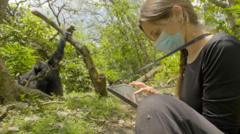On a scenic day in April, Ryan Huish, a biology professor from the University of Virginia’s College at Wise, guides a group of students through his lush forested property in Duffield, Virginia. Nestled within the vibrant greenery, he cultivates a garden abundant in medicinal herbs reminiscent of the region's rich Appalachian cultural heritage.
For many generations, local fauna such as ramps, trout lilies, and Appalachian wasabi have been staples in the diets and traditional medicine practices of the area. However, the wild harvesting of these botanicals has gone unchecked for decades, leading to declining prices and an alarming trend of overharvesting.
As part of the initiative dubbed "50 States, 50 Fixes," aimed at addressing environmental challenges through local solutions, Katie Commender, director of the Appalachian Harvest Herb Hub, emphasizes the urgency in preserving these traditions. She notes the deep-rooted practice of trading forest botanicals, which has thrived for over 300 years in the Appalachian Mountains. The cultural transmission of this knowledge to future generations is of paramount concern to local herbal dealers.
Through community collaboration and a commitment to sustainable harvest practices, Virginians are working to rekindle the once-flourishing herbal economy, ensuring that the legacy of their forebears continues to flourish for many years to come.





















